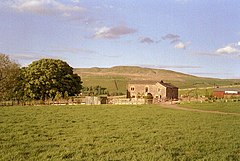Stainmore
| Stainmore | |
|---|---|
 Mousegill, with Great Knipe behind |
|
| Stainmore shown within Cumbria | |
| Population | 264 (2011) |
| OS grid reference | NY8314 |
| Civil parish |
|
| District | |
| Shire county | |
| Region | |
| Country | England |
| Sovereign state | United Kingdom |
| Post town | KIRKBY STEPHEN |
| Postcode district | CA17 |
| Dialling code | 01768 |
| Police | Cumbria |
| Fire | Cumbria |
| Ambulance | North West |
| EU Parliament | North West England |
| UK Parliament | |
Stainmore is a remote geographic area in the Pennines on the border of Cumbria, County Durham and North Yorkshire. The name is used for a civil parish in the Eden District of Cumbria, England, including the villages of North Stainmore and South Stainmore. The parish had a population of 253 in the 2001 census, increasing to 264 at the Census 2011. Stainmore Forest stretches further east into County Durham, towards Bowes.
Stainmore is drained by the River Belah and the River Balder. It is crossed by the Roman road from Bowes to Brough, now part of the A66, and formerly by the Stainmore Railway. Each of these lines of communication has made use of the relatively low broad saddle between the higher hills to north and south which is commonly referred to as the Stainmore Gap. The summit of the former railway is around 420 metres (1,380 ft) above sea level, though the roads climb to slightly higher elevations. The Gap is coincident with the Stainmore Summit Fault which throws the relatively flat-lying Carboniferous rocks of the area down to the south. It acted as a conduit for Lake District-originated ice to pass eastwards during one or more glacial periods. There are several RIGS sites in the Stainmore area, and Bowes Moor is a Site of Special Scientific Interest.
...
Wikipedia

